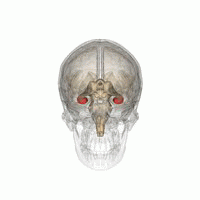
Photo from wikipedia
High-fat diets (HFDs) adversely influence glutamate metabolism and neurotransmission. The precise role of the group II metabotropic glutamate receptors (mGluR2/3) antagonist on spatial memory deficit following consumption of HFD has… Click to show full abstract
High-fat diets (HFDs) adversely influence glutamate metabolism and neurotransmission. The precise role of the group II metabotropic glutamate receptors (mGluR2/3) antagonist on spatial memory deficit following consumption of HFD has not yet been clarified. Therefore, in this study, we examined the effects of post-training administration of mGluR2/3 antagonism; LY341495 on spatial memory in rats fed with HFD (for 10 weeks) by using Morris Water Maze (MWM) task. The training session for testing memory acquisition in MWM consisted of 4 trials per day for 4 consecutive days. Twenty-four hours after the last training session the spatial probe test (retention) was given. Intraperitoneal injection (i.p) injection of LY341495 was done 30 min before probe test. Our results showed that 10 weeks consumption of HFD had no significant effect on escape latency and swimming distance in memory acquisition. Our finding showed that consumption of a HFD leads to reference memory impairment in the probe test. HFD animals spent less time in the target zone in compare with control animals. Also, LY341495 improved HFD-induced reference memory (retention) impairment. HFD animals treated with LY341495 spent more time in the target zone in compare with HFD animals. Escape latencies to find the visible platform during visual task were same in all experimental groups, indicating no visual impairment in the animals. We propose that a HFD may act through mGluR2/3 within the brain to reduce synaptic plasticity, which impairs memory retrieval, and post-training administration of LY341495 can reduce HFD-induced reference memory impairment.
Journal Title: IBRO Reports
Year Published: 2020
Link to full text (if available)
Share on Social Media: Sign Up to like & get
recommendations!